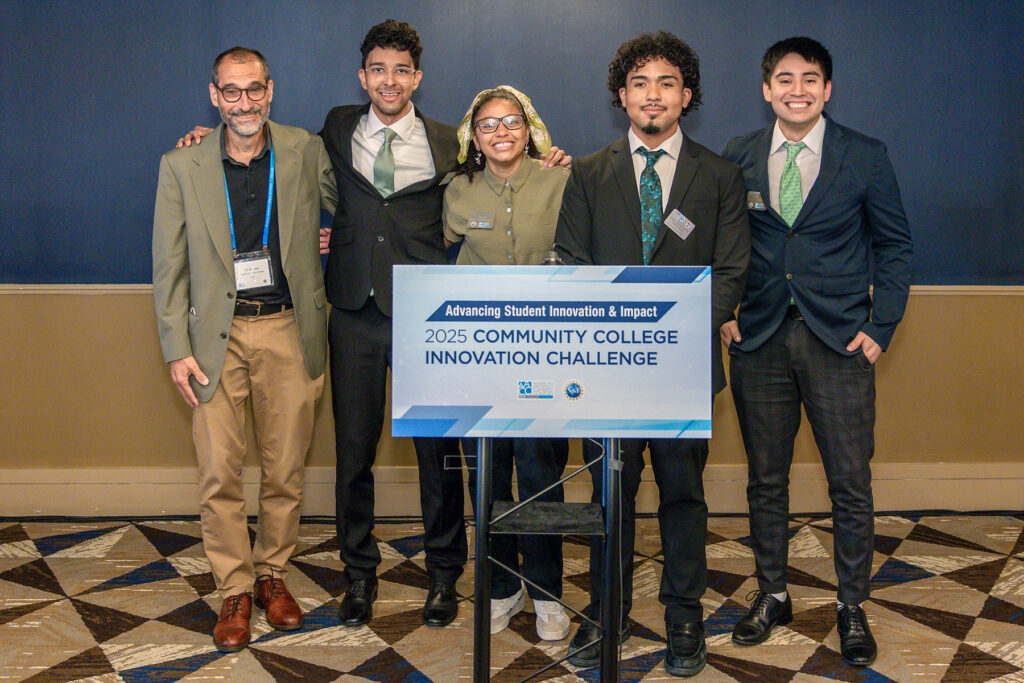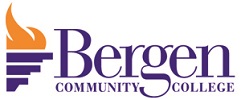Find your path to success with a diverse range of more than 120 degree, certificate, and continuing education programs.

Bergen Community College Professor PJ Ricatto, Ph.D. and students Alejandro Olarte, Estrella Luna, Derek Gonzalez and Lisandro Martinez.
PARAMUS, N.J. – For an unprecedented second time in four years, Bergen Community College STEM students have placed first in the nationwide Community College Innovation Challenge. Sponsored by the American Association of Community Colleges and National Science Foundation, four Bergen students earned first place honors for their project, “Pop-Up Hydroponic Farming Made from Recycled Materials.” Chemistry Professor PJ Ricatto, Ph.D., mentored the students.
“All five of us were in tears,” he said. “This was not an easy task.”
Students Alejandro Olarte, of Wayne; Derek Gonzalez, of Paterson; Estrella Luna, of River Vale; and Lisandro Martinez, of Bergenfield, along with Ricatto, travelled to Washington D.C. from June 9-12 to participate in the national competition alongside 50 students from 12 community colleges across the United States. Students also participated in an Innovation Boot Camp, providing them with professional development and mentoring meant to develop the teams’ strategic communication and entrepreneurial skills.
The first-place project features what the team calls “stacks” – three-tiered towers of reclaimed shipping pallets, hydroponic beds and LED lights for growing plants. The team aims to place the stacks in unoccupied retail spaces, thereby giving the buildings a new purpose as “food-production community centers” to provide local residents with freshly grown produce. Inspiration for the project came from a 2023 Journal of Obesity study that found only 26 percent of New Jersey adults consume the recommended five daily servings of fruits and vegetables. Coupled with rising rates of food insecurity and so-called “food swamps” and “food deserts” where communities lack access to fresh produce, the students sought to affect change. Luna, a biology student, led the group’s research into food swamps, food insecurity and hydroponic farming.
“Working with hydroponics overall has made me more interested in food supply and nutrition,” she said.
Ricatto said the students communicated the issue clearly and explained how hydroponic farming can help remedy societal problems.
“I think I’m most proud of their ability to listen and adjust their pitch to make sure that it was as understandable as possible to someone who has no knowledge of this field,” he said.
Gonzalez, a chemistry student, said winning the Innovation Challenge meant more because of the bond the team developed.
“It was an amazing moment made unforgettable because I was able to share this victory with friends I care about deeply,” he said.
Bergen teams have advanced to the Innovation Challenge finals in four of the last five years, placing first twice.
STEM represents a signature program for Bergen, which maintains a unique-to-community colleges STEM student research center. Dean of Math, Science and Technology Emily Vandalovsky, Ph.D., said the College has become a magnet for STEM excellence.
“It is highly rewarding to be recognized at the national level yet again,” she said. “Under the guidance of talented and knowledgeable faculty, such as Professor Ricatto, our research program has become a true catalyst for inspiring innovation and passion among STEM students to implement viable and sustainable solutions for serious socio-economic issues.”
Based in Paramus, Bergen Community College (www.bergen.edu), a public two-year coeducational college, enrolls more than 13,000 students at locations in Paramus, the Philip Ciarco Jr. Learning Center in Hackensack and Bergen Community College at the Meadowlands in Lyndhurst. The College offers associate degree, certificate and continuing education programs in a variety of fields. More students graduate from Bergen than any other community college in the state.
# # #
